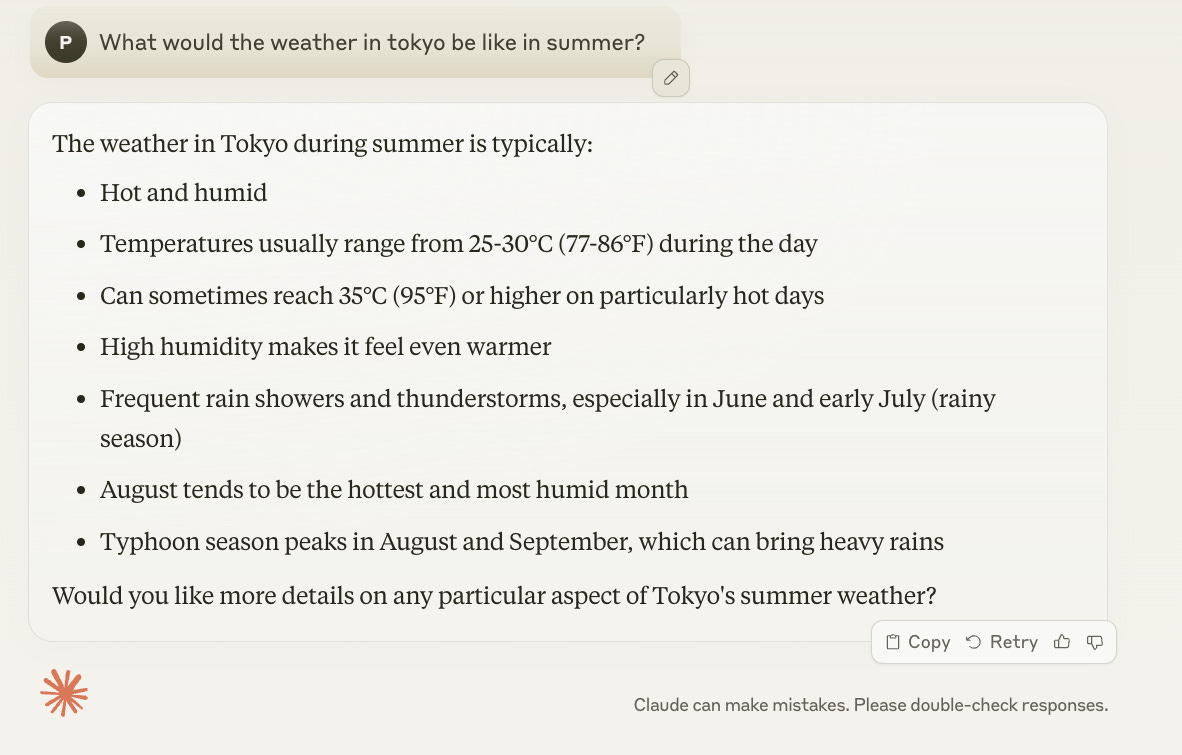Using Claude AI for Personal Tasks
Learn how to use Claude AI for personal tasks like travel planning, workout plans, recipes, book recommendations, social media content & writing feedback
AI Tool: Claude
Level: Beginner
Access: Free
This guide is part 3 of the free course Learn how to use Claude.
In this guide, we will cover:
Setting up Claude
Using Claude
Example tasks
Travel Itinerary Planning
Customised Workout Routines
Customised Recipe Suggestions
Book Recommendations
Social Media Content Ideas
Writing feedback
Tips & best practices
Setting up Claude
To start using Claude, you will first need to create an account which you can do here on the Claude website.
There are two options: a free plan that uses slightly older versions of Claude and a paid plan that uses the latest version using Claude Pro.
The free plan also has certain limits such as a limited number of daily queries and slower response times at peak periods.
The paid Pro plan offers:
5x more usage than the free tier provides, with the ability to send many more messages
Priority access to Claude.ai during high-traffic periods
Early access to new features that help you get the most out of Claude
If you are new to using AI and just trying things out, I'd recommend you use the free plan which should be more than enough for light daily use.
Using Claude
Once you have created your account and signed in, you should see a web page like this.
Using Claude here is fairly straightforward, just type your question where it says 'How can Claude help you today?' and enter.
As you start to use AI tools like Claude, or ChatGPT, you'll often hear about something called 'Prompts', what are these?
Prompts are just the text requests you enter into AI tools like Claude. You might think getting Claude to do things is as simple as just asking it, and it can be.
However, you'll often get the best results by learning how to prompt in a particular way. Prompting is as much an art as it is a science, and we will go more into that later in the course so don't worry about that for now.
Right now, let's get stuck into some examples to get you started on using Claude to help you do various personal tasks you might have.
Example tasks
Travel Itinerary Planning
As we learned in previous guides, AI tools like Claude have studied trillions of resources such as books, web pages and more - Claude knows a lot, including what's required to plan a trip.
Example prompt:
Plan a 2-day trip to Japan for me, including flights, accommodations, and activities in Tokyo
Remember you can follow up with more questions to get more details for example:
Customised Workout Routines
Claude has also studied billions of online resources on exercise. You can use Claude to give you an exercise plan customised for your needs:
Example prompt:
Create a 3-day exercise routine using body weight or objects easily available in a home as I will be working out at home.
You'll notice it created the routine itself as a downloadable separate document.
You can further customise this routine, say for example you had an injury and wanted to adjust the program around that.
Example prompt
I just got an injury on my right foot, so I can't put much pressure on it, but the rest of my body feels fine. Create a new routine with the same goals but work around this injury.
Customised Recipe Suggestions
Have you ever found yourself with a few bits of food at home but do not know what to cook with them? I know I have.
Claude can do more than come up with generic recipes, it can create a customised meal around the ingredients you have.
Example prompt:
Suggest a dinner recipe using chicken, broccoli, and rice, and provide step-by-step cooking instructions
Sounds delicious!
Book Recommendations
Not sure what to read next, but know what you like? Claude can help, with a deep understanding of every book that's ever been published.
Example Prompt:
Recommend three mystery novels similar to Agatha Christie's works that I might enjoy.
Remember as always, you can follow up with extra questions to clarify things or go in a different direction.
Social Media Content Ideas
You probably have social media accounts for personal use. Sometimes we can get a bit stuck for good ideas about what to post about, know what I mean?
Claude has carefully studied billions of social media posts and understands popular topics, as well as what style of writing is most engaging.
When you're stuck on what to post about on social media, let Claude help you.
Example prompt:
Suggest five engaging Instagram post ideas for my travel blog.
Writing feedback
Many of us will need to write for different reasons, maybe an email or letter to a friend or organisation., I often write articles for this publication.
When we write, it's usually a lonely task, we don't often have someone handy to look over what we have written to check for any mistakes, or for a second opinion on how it could be improved.
But getting feedback on your writing can be extremely helpful to help you better communicate with others, and to make sure people understand what you mean.
Here's a prompt to get feedback on the opening text I wrote for one of my most popular articles.
Example prompt:
Here is some text I wrote at the end in quotes. Tell me what's good about it, not so good about it, and what could be improved 'What makes you compelled to feel something, to buy something, or click on a link? Have you ever wondered?'
Notice how I used the quotes so Claude can clearly understand the difference between my request and the text I want it to analyse.
The great thing about using Claude for improving your writing is you can keep using it again and again, it will never get bored or annoyed!
This is one of my favourite uses for Claude which I use all the time.
I use it not only for article writing but professional letters, even personal letters sometimes, just to get some independent feedback on how my writing comes across.
You don't have to agree with all its suggestions, but having a second opinion on your writing whenever you want it, instantly, to help you improve, can be extremely useful for you.
Tips & best practices
Try out these examples and change them for what you need. Here are a few quick tips to help you get the best results:
Be specific and clear: Craft your questions with clarity and specificity to get the most accurate and helpful responses.
Simplify Complex Tasks: Divide large tasks into smaller, bite-sized steps that are easier to tackle and understand.
Add Context for Clarity: Share relevant background information and context when necessary to help Claude AI provide more informed and tailored responses.
Try asking in different ways: Sometimes asking for the same thing in different ways can get better results. Experimentation is key to the best results.
In the next guide, we will look at using Claude for work tasks.
Next in this course: Using Claude for Work Tasks












